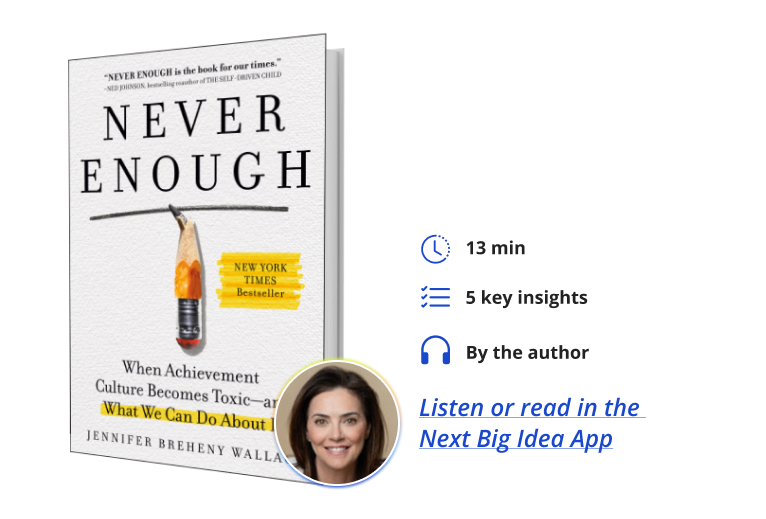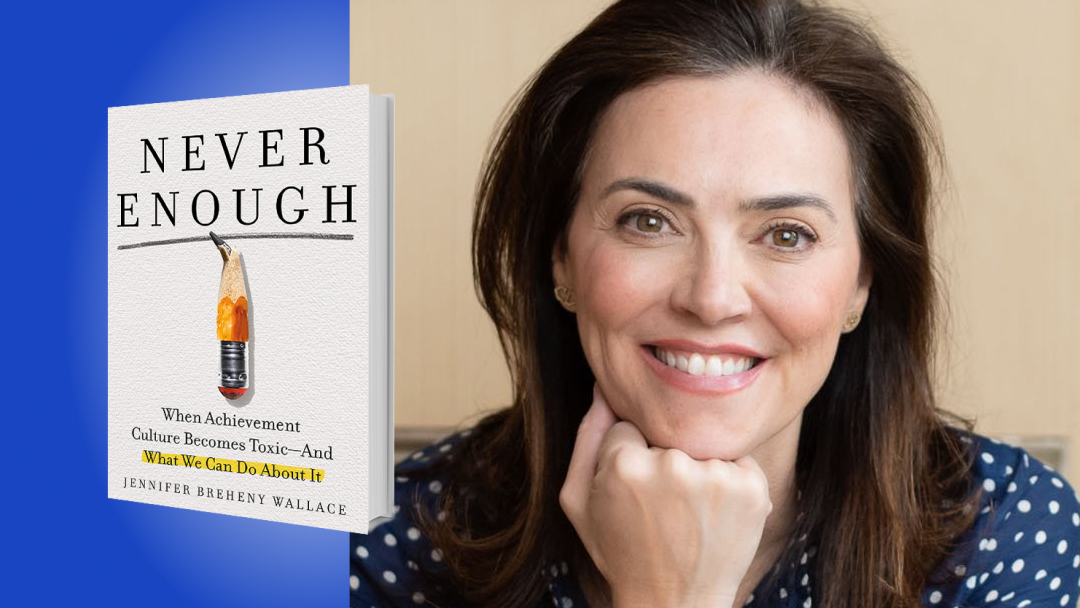Jennifer Breheny Wallace is an award-winning print and television journalist. She is a frequent contributor to The Wall Street Journal and The Washington Post. Her career began at CBS “60 Minutes,” where she was on a team that won The Robert F. Kennedy Award for Excellence in Journalism. Jennifer also serves on the board of the Coalition for the Homeless in New York City.
Below, Jennifer shares 5 key insights from her new book, Never Enough: When Achievement Culture Becomes Toxic—And What We Can Do About It. Listen to the audio version—read by Jennifer herself—in the Next Big Idea App.

1. An unmet need to matter is at the root of so much suffering.
When it comes to parents’ worries, the mental health of their children tops the list. We are experiencing a devastating epidemic of youth anxiety, depression, and loneliness. So much so that it prompted Surgeon General Dr. Vivek Murthy to issue a rare public health advisory on the topic. Murthy noted that the mental health of young people is shaped by many factors, from their genes to larger social forces, like cultural messaging that can erode a sense of self-worth—telling youth they are not good looking enough, popular enough, smart enough, or rich enough.
At the root of that “never enough” feeling is what psychologists call an unmet need to matter. Mattering is the personal belief that we are valued for who we are at our core, away from external achievements. Since the 1980s, a growing body of research has found that people with high levels of mattering—those who feel valued and depended on for adding meaningful value to others—are more likely to thrive in adolescence and adulthood. But today we are facing a mattering deficit within households, schools, workplaces, and entire communities. The good news is that mattering offers a rich, intuitive framework for protecting youth mental health.
The concept of mattering is as simple as it is profound. It asks questions that everyone has wondered: Do people value, appreciate, and respect me or am I invisible? Do I belong here or am I alone in this world? Does my life impact other people’s lives or is my life of no consequence? Mattering expresses the deep, universal need we have to feel seen, cared for, and valued by those around us. Feeling like you matter for who you are deep inside is both a core strength and an armor that protects against external pressures.
2. To matter, we must help kids untangle their self-worth from their achievements.
I went in search of healthy strivers to see what they had in common: What did their parents focus on at home? What were their mindsets, behaviors, and relationships like? They all felt they mattered within their families, schools, and larger communities. In a world that often makes us feel like we’re never enough, mattering reassures us that simply being yourself is enough, regardless of what you do.
To be clear, mattering isn’t mutually exclusive of performance. In fact, it fuels it. When we matter, we are more likely to participate in positive, healthy ways in our families, schools, and communities. It is not enough to simply love our kids unconditionally. They must feel that that love is unconditional. They must realize their mattering, their value, is never in question.
“It is not enough to simply love our kids unconditionally.”
One wise parent showed me how to make the thinking around unconditional love and mattering visible: Take a $20 bill out of your wallet and ask your child if they want it. Then, crumple it on the floor, make it wrinkled and dirty, and then dunk it into a glass of water. Now, hold that dirty, soggy bill and ask your child if they still want it. Then get explicit: Like this $20 bill, your value doesn’t change whether you’re cut from the team, get a bad grade, or feel rejected by a friend. Your value is your value. It doesn’t waver.
3. To help the child, first help the caregiver.
In the past, psychologists interested in helping struggling children focused on specific interventions: set limits that are firm but reasonable, be affectionate but don’t be intrusive, give honest feedback without being critical. But it turns out that what makes the biggest impact on a child isn’t a list of dos and don’ts. The best thing we can do is to make sure the adults in that child’s life are psychologically healthy and that they have strong, reliable sources of support. Psychologists say this directive has turned child development upside down: to help the child, first help the caregiver.
Parents are “first responders” to our kids’ struggles and paying constant attention to their roller-coaster feelings and social and academic pressures can take a toll. All the ways we are overstretched—work deadlines, financial anxieties, meeting our child’s every need—can deaden our ability to be sensitive, responsive parents. It can make us less attuned to our children’s emotional cues. The risk here is that our kids can misinterpret our stress and impatience, internalizing the belief that something must be wrong with them. A feeling of not mattering, researchers note, is often rooted in small actions that accumulate daily.
Kids don’t need parents who take self-sacrifice to the extreme. They need parents who have some perspective on the fraught high-achievement culture they find themselves in. They need parents who have the wisdom, energy, and psychological bandwidth to call out the unhealthy values of achievement culture for the threats they are. It seems counterintuitive, but to care for our kids we must first care for ourselves because a child’s resilience rests on their caregivers’ resilience.
4. Resilience rests on relationships.
The key to resilience is not the “me time” marketed to tired parents by the multi-billion-dollar self-care industry. Instead, research finds, it rests on the strength of our relationships: Do we have the kind of rich relationships that make us feel deeply loved, seen, and cared for, as we try to be with our own kids?
“It can feel impossible to meet a friend for coffee or intentionally share your worries because of the many parenting demands.”
Just as a child’s resilience rests on a parent’s resilience, a parent’s resilience rests fundamentally on the depth and support of their relationships. Deep friendships act as shock absorbers, buffering against the wear and tear of daily stress, lowering anxiety, and regulating emotions. But, in our busy modern times, parents often don’t have the time or emotional bandwidth to deepen the commitment and intimacy of friendships. It can feel impossible to meet a friend for coffee or intentionally share your worries because of the many parenting demands—acting as a homework helper, short-order cook, and screen-time monitor.
What researchers have found is that people don’t need hours of time together to foster authentic friendships. What they need is deliberate time and a willingness to open up. Consider how deliberate you are with your family’s schedule: pulling up your calendar for a playdate or a child’s dentist appointment. What would it look like for you to be just as deliberate with the friendships that sustain you? There’s an assumption that friendships just happen. This myth can hold us back from pursuing and nurturing deep relationships.
5. We all crave social proof that we matter.
Parents tend to focus on what we are told is the ultimate goal: to raise independent, self-reliant adults. While it’s important to foster independence, if we’re looking to protect our children’s mental health, there’s an even bigger lesson we need to teach: how to be interdependent, as in how to rely on others and allow others to rely on them in healthy ways. Parents who teach their children the skills of interdependence openly acknowledge the courage it takes to ask for and accept support. They coach their kids on the cycle of generosity: just as important as it is to help others, we must be willing to be vulnerable and accept that support too. Interdependence offers children opportunities to feed their own mattering and unlock the mattering in others.
Too many people don’t have a firm sense of mattering. They question their importance, their significance, their value, and this comes out in their actions as hyper-competition, a lack of civility, or anger. We cannot matter alone. We matter in relationship with others. It’s so easy to lose sight of our own value. That’s why we need other people to tell us, remind us, insist on how inherently valuable we are—and others need us to remind them of their mattering, too. If we can start making people know that they truly, deeply, unequivocally matter to their families, friends, and communities, imagine what the world would look like, feel like, be like? It’s within our reach. We just need the courage to matter and the courage to reassure people in our lives that they matter, too.
To listen to the audio version read by author Jennifer Breheny Wallace, download the Next Big Idea App today:
































